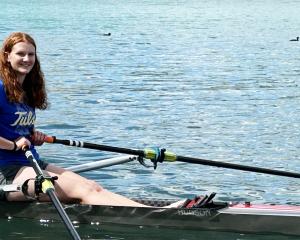Richard Scott works in a world where everything comes in double-extra-large.
Oil rigs weighing 14,000 tonnes, 12-tonne anchors with 300-tonne, 1800m-long chains, and 275m-long ships, working in 700m deep seas for months at a time.
The Cromwell man's job on the 109m-wide exploratory oil rig Ocean Patriot, which can drill to about 6000m of water, has taken him from the coasts of New Zealand to the waters of Australia, Southeast Asia, and the North Sea.
Experiences in seven years on rigs have included travel, exotic wildlife, challenging work, and weathering storms.
Flying around the world as a ballast control operator, working in a high-risk environment was not always the life he knew.
In fact, he did not even know training for rig work existed until someone asked him if he had considered it, about eight years ago.
He sold his viticultural contracting business, went to drilling school in Taranaki, and began a physically challenging job as a deck hand on a rig in 2007.
''Some people react with raised eyebrows and wonder how you can go from a pretty sedentary administration role to one where you are learning a whole new range of skills.''
The work was a world apart from his previous role as principal at Cromwell Primary School, which he left in 2003.
His first time on the rig he had never seen anything like it.
''It was big, noisy, and made of steel. I have seen guys turn up for the first day of work and head home on the helicopter the next day.''
On the rig, Mr Scott had also worked as a deck co-ordinator and a crane operator.
There were some similarities between working at schools and on rigs, he said.
''Both are high responsibility jobs, just different forms.''
He did miss some things about schools, however.
''I used to get a real buzz out of seeing kids move from a different stage of learning. That was pretty neat. The big kick working in a school was seeing kids grow and develop over time.
''I miss all that but the satisfaction in the job I have at the moment is every day is different ... weather can impact how you do your job, mechanical issues with gear. There's a lot of things.''
Another thing to consider on rigs, which had to be serviced every five months, were safety networks, he said.
''A couple of hundred kilometres off the coast you are on your own, especially in weather bad.''
Often the portable rig, transported around the world by large ''heavy lift'' ships, was located out of the sight of land.
''You do realise how insignificant things are when you are out in the middle of the ocean. The weather gives you a good impression of how monty old Mother Nature is.''
As a result, workers, often from diverse backgrounds, were trained in skills such as firefighting.
However, bad weather was often avoided.
''We get a pretty good warning about incoming cyclones and evacuate people.''
An ''emphasis on safety'' was adhered to by the company he worked for, and his family knew he was ''reasonably'' safe, he said.
Workers were ''pretty well looked after'' in a job that was not as uncommon as most people thought.
''I was surprised how many people are doing it,'' Mr Scott said.
The key to his change in career, however, was family.
Previous jobs, even those closer to home, did not allow him quality family time.
Being able to attend events such as school camps was one of the benefits of the month-on, month-off roster.
Is he happy in the job?
''Oh yeah. I'm often asked if I would go back teaching. I'm pretty sure I never would.''














